IASB Framework Redesign: Improving Financial Reporting Quality
VerifiedAdded on 2023/06/12
|13
|4316
|222
Essay
AI Summary
This essay critically examines the impact of the International Accounting Standards Board's (IASB) redesigned framework on enhancing financial reporting. It discusses the objectives of general-purpose financial reporting, including providing information on economic resources, obligations, and changes therein. The analysis covers the role of accrual accounting, past cash flows, and the use of economic resources, emphasizing the importance of cost constraints. Furthermore, the essay delves into the usefulness of qualitative characteristics and accounting concepts referred to in IAS 1, exploring how they serve the purpose of ensuring comparability in financial statements across different periods and enterprises. The essay concludes by highlighting the ongoing efforts to improve international financial reporting standards and foster collaboration between the IASB and other standard-setting bodies. Desklib offers additional resources, including past papers and solved assignments, to aid students in their studies.
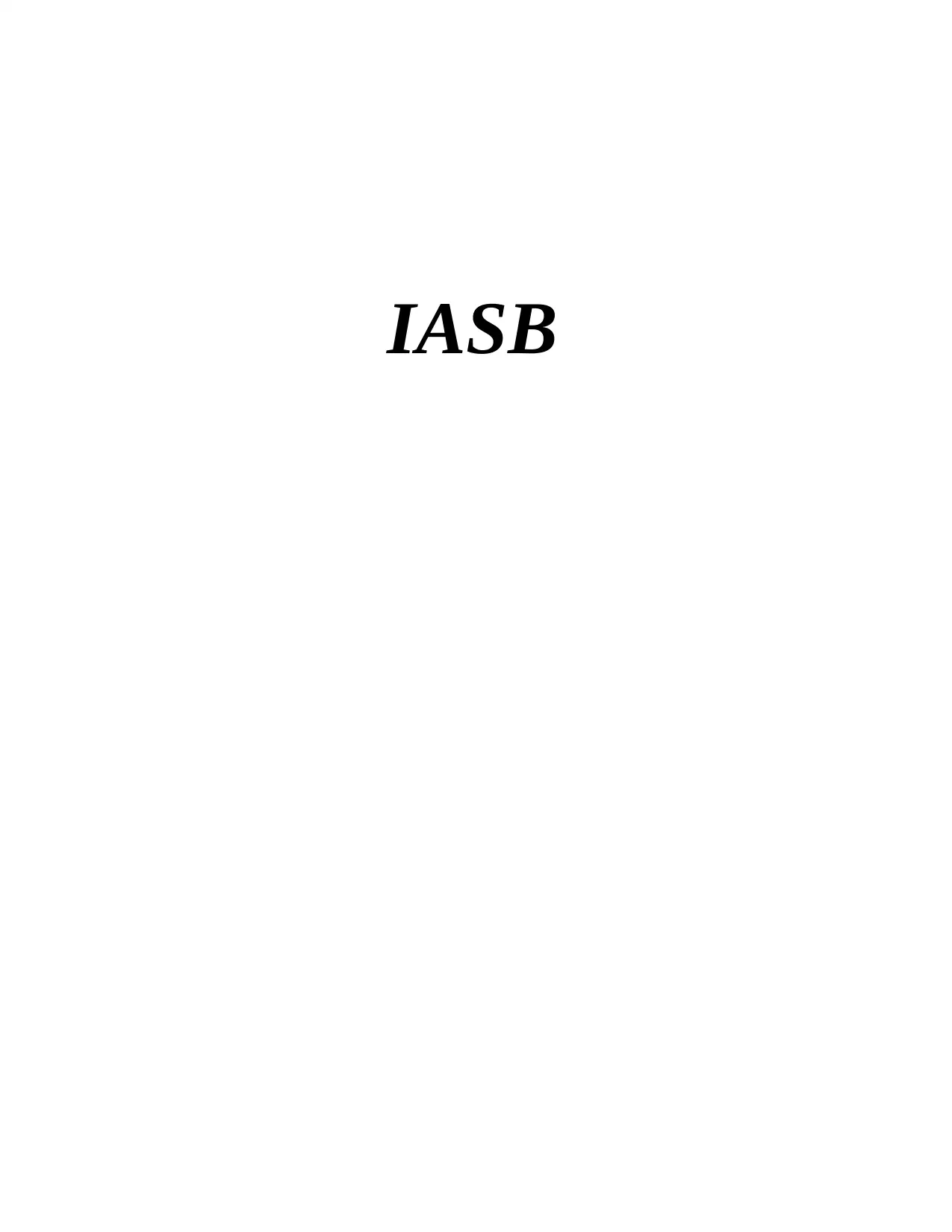
IASB
Paraphrase This Document
Need a fresh take? Get an instant paraphrase of this document with our AI Paraphraser
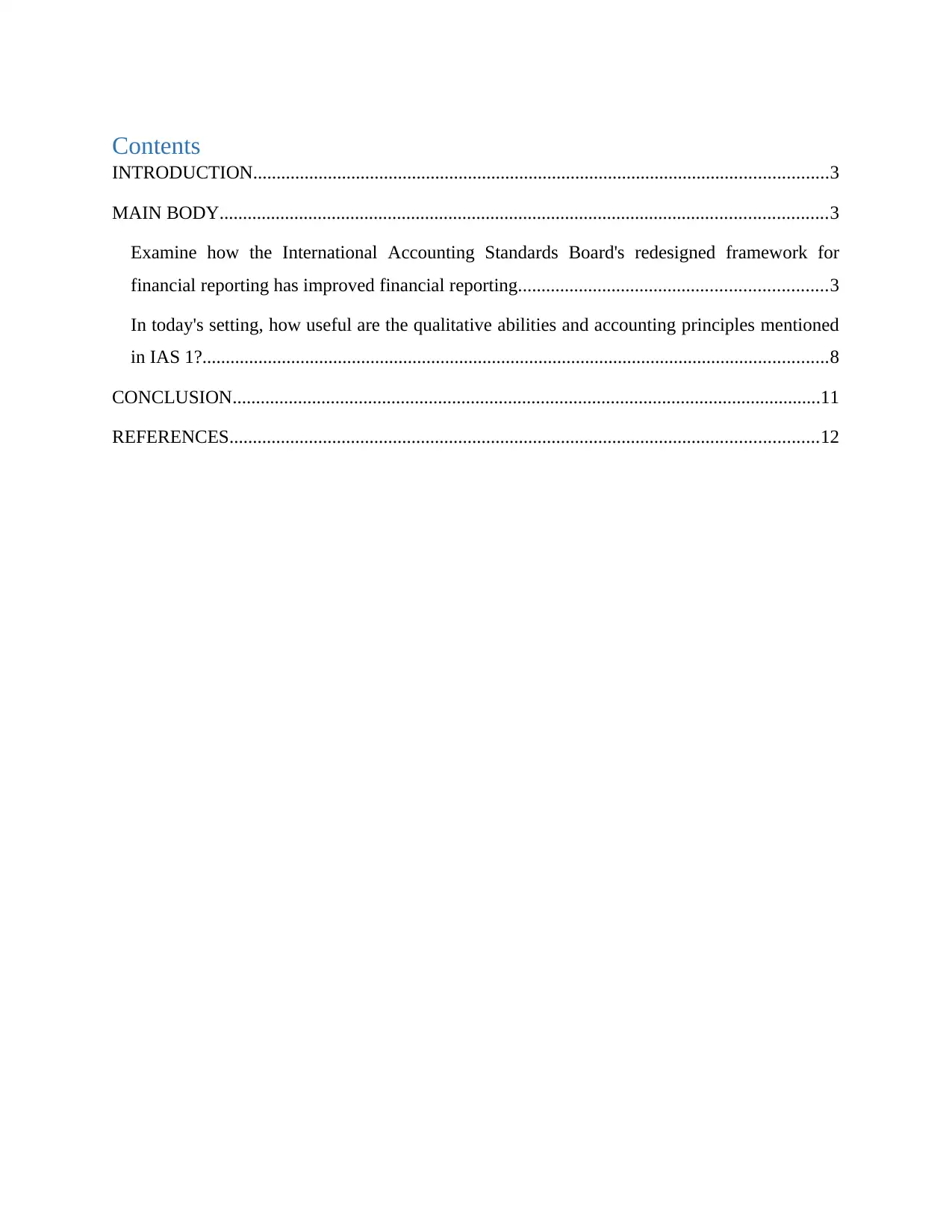
Contents
INTRODUCTION...........................................................................................................................3
MAIN BODY..................................................................................................................................3
Examine how the International Accounting Standards Board's redesigned framework for
financial reporting has improved financial reporting..................................................................3
In today's setting, how useful are the qualitative abilities and accounting principles mentioned
in IAS 1?......................................................................................................................................8
CONCLUSION..............................................................................................................................11
REFERENCES..............................................................................................................................12
INTRODUCTION...........................................................................................................................3
MAIN BODY..................................................................................................................................3
Examine how the International Accounting Standards Board's redesigned framework for
financial reporting has improved financial reporting..................................................................3
In today's setting, how useful are the qualitative abilities and accounting principles mentioned
in IAS 1?......................................................................................................................................8
CONCLUSION..............................................................................................................................11
REFERENCES..............................................................................................................................12
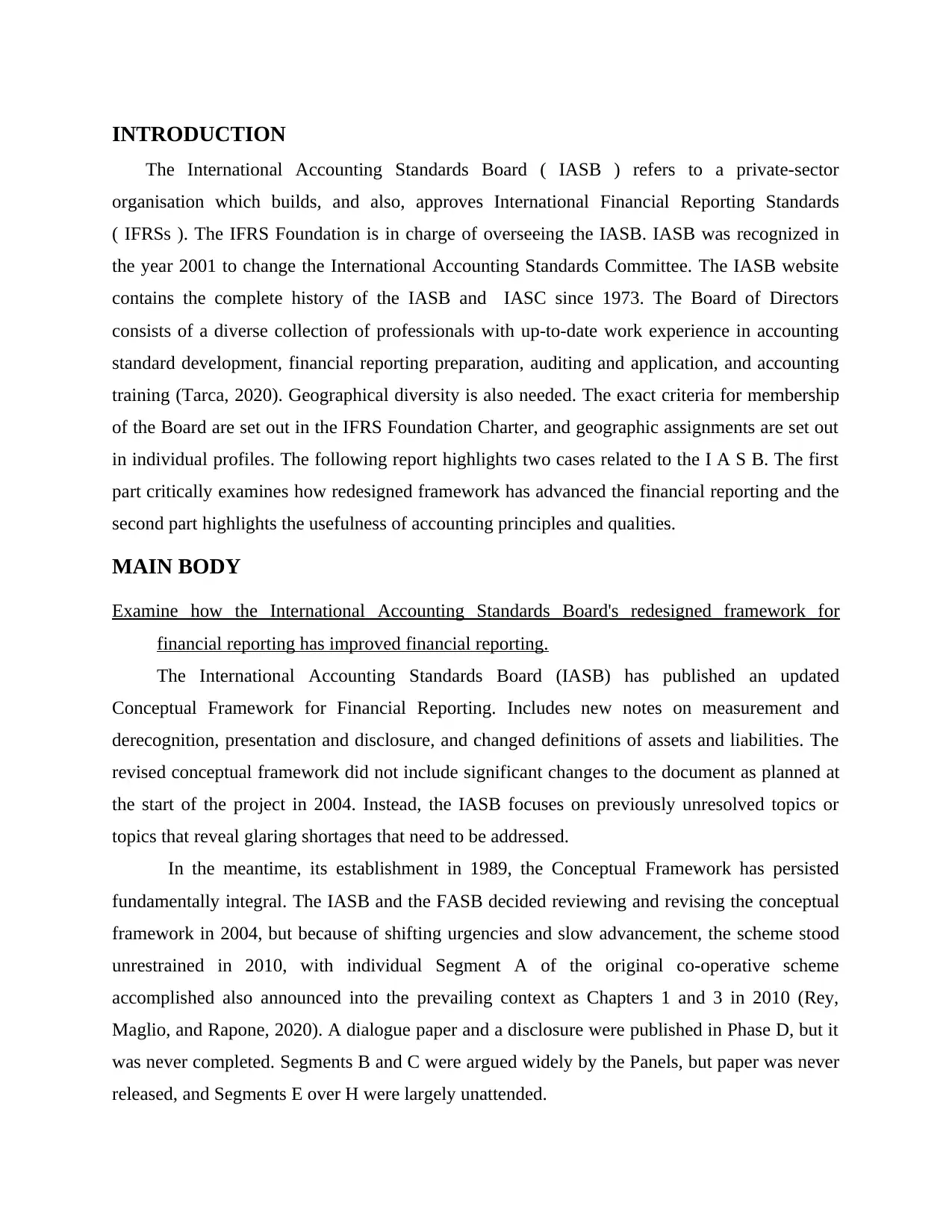
INTRODUCTION
The International Accounting Standards Board ( IASB ) refers to a private-sector
organisation which builds, and also, approves International Financial Reporting Standards
( IFRSs ). The IFRS Foundation is in charge of overseeing the IASB. IASB was recognized in
the year 2001 to change the International Accounting Standards Committee. The IASB website
contains the complete history of the IASB and IASC since 1973. The Board of Directors
consists of a diverse collection of professionals with up-to-date work experience in accounting
standard development, financial reporting preparation, auditing and application, and accounting
training (Tarca, 2020). Geographical diversity is also needed. The exact criteria for membership
of the Board are set out in the IFRS Foundation Charter, and geographic assignments are set out
in individual profiles. The following report highlights two cases related to the I A S B. The first
part critically examines how redesigned framework has advanced the financial reporting and the
second part highlights the usefulness of accounting principles and qualities.
MAIN BODY
Examine how the International Accounting Standards Board's redesigned framework for
financial reporting has improved financial reporting.
The International Accounting Standards Board (IASB) has published an updated
Conceptual Framework for Financial Reporting. Includes new notes on measurement and
derecognition, presentation and disclosure, and changed definitions of assets and liabilities. The
revised conceptual framework did not include significant changes to the document as planned at
the start of the project in 2004. Instead, the IASB focuses on previously unresolved topics or
topics that reveal glaring shortages that need to be addressed.
In the meantime, its establishment in 1989, the Conceptual Framework has persisted
fundamentally integral. The IASB and the FASB decided reviewing and revising the conceptual
framework in 2004, but because of shifting urgencies and slow advancement, the scheme stood
unrestrained in 2010, with individual Segment A of the original co-operative scheme
accomplished also announced into the prevailing context as Chapters 1 and 3 in 2010 (Rey,
Maglio, and Rapone, 2020). A dialogue paper and a disclosure were published in Phase D, but it
was never completed. Segments B and C were argued widely by the Panels, but paper was never
released, and Segments E over H were largely unattended.
The International Accounting Standards Board ( IASB ) refers to a private-sector
organisation which builds, and also, approves International Financial Reporting Standards
( IFRSs ). The IFRS Foundation is in charge of overseeing the IASB. IASB was recognized in
the year 2001 to change the International Accounting Standards Committee. The IASB website
contains the complete history of the IASB and IASC since 1973. The Board of Directors
consists of a diverse collection of professionals with up-to-date work experience in accounting
standard development, financial reporting preparation, auditing and application, and accounting
training (Tarca, 2020). Geographical diversity is also needed. The exact criteria for membership
of the Board are set out in the IFRS Foundation Charter, and geographic assignments are set out
in individual profiles. The following report highlights two cases related to the I A S B. The first
part critically examines how redesigned framework has advanced the financial reporting and the
second part highlights the usefulness of accounting principles and qualities.
MAIN BODY
Examine how the International Accounting Standards Board's redesigned framework for
financial reporting has improved financial reporting.
The International Accounting Standards Board (IASB) has published an updated
Conceptual Framework for Financial Reporting. Includes new notes on measurement and
derecognition, presentation and disclosure, and changed definitions of assets and liabilities. The
revised conceptual framework did not include significant changes to the document as planned at
the start of the project in 2004. Instead, the IASB focuses on previously unresolved topics or
topics that reveal glaring shortages that need to be addressed.
In the meantime, its establishment in 1989, the Conceptual Framework has persisted
fundamentally integral. The IASB and the FASB decided reviewing and revising the conceptual
framework in 2004, but because of shifting urgencies and slow advancement, the scheme stood
unrestrained in 2010, with individual Segment A of the original co-operative scheme
accomplished also announced into the prevailing context as Chapters 1 and 3 in 2010 (Rey,
Maglio, and Rapone, 2020). A dialogue paper and a disclosure were published in Phase D, but it
was never completed. Segments B and C were argued widely by the Panels, but paper was never
released, and Segments E over H were largely unattended.
⊘ This is a preview!⊘
Do you want full access?
Subscribe today to unlock all pages.

Trusted by 1+ million students worldwide
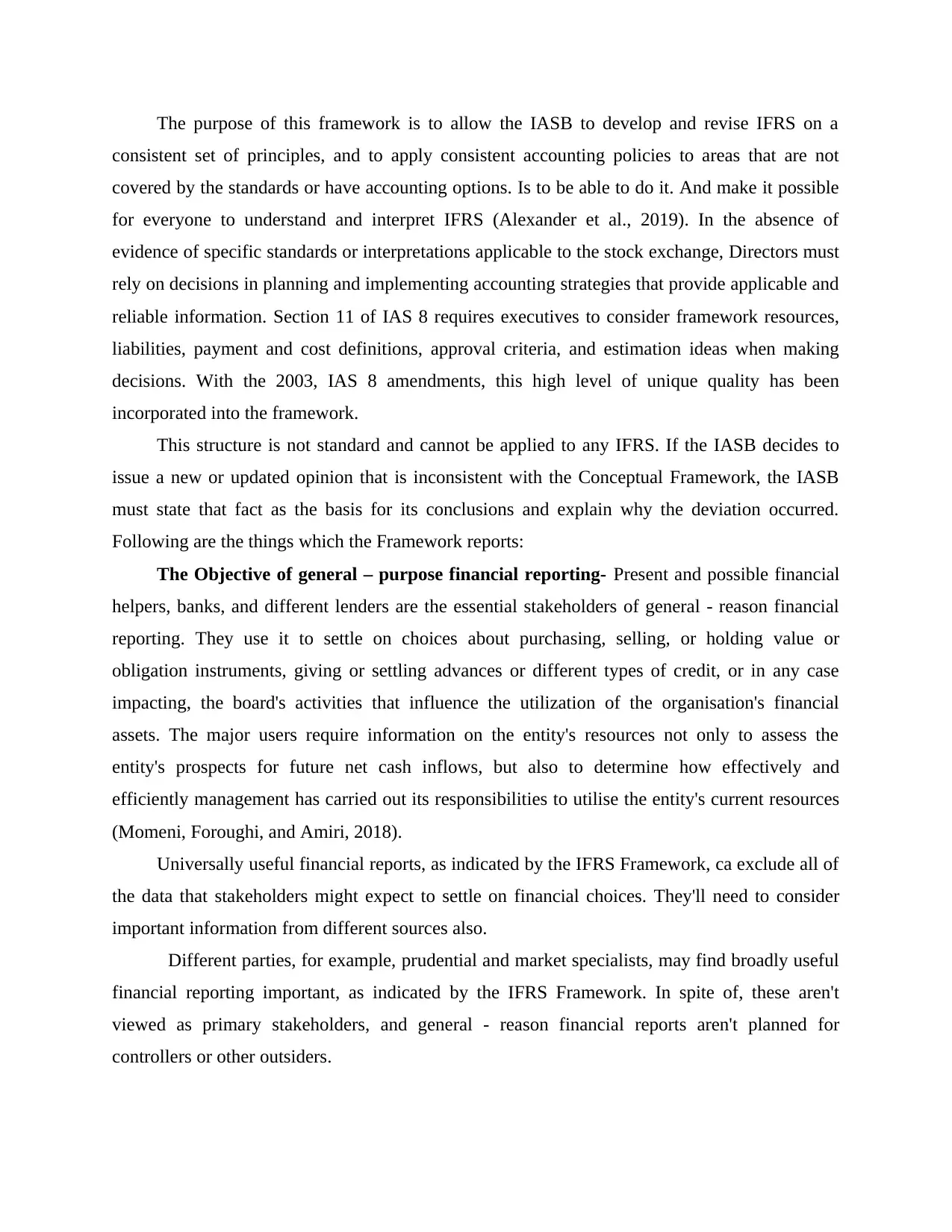
The purpose of this framework is to allow the IASB to develop and revise IFRS on a
consistent set of principles, and to apply consistent accounting policies to areas that are not
covered by the standards or have accounting options. Is to be able to do it. And make it possible
for everyone to understand and interpret IFRS (Alexander et al., 2019). In the absence of
evidence of specific standards or interpretations applicable to the stock exchange, Directors must
rely on decisions in planning and implementing accounting strategies that provide applicable and
reliable information. Section 11 of IAS 8 requires executives to consider framework resources,
liabilities, payment and cost definitions, approval criteria, and estimation ideas when making
decisions. With the 2003, IAS 8 amendments, this high level of unique quality has been
incorporated into the framework.
This structure is not standard and cannot be applied to any IFRS. If the IASB decides to
issue a new or updated opinion that is inconsistent with the Conceptual Framework, the IASB
must state that fact as the basis for its conclusions and explain why the deviation occurred.
Following are the things which the Framework reports:
The Objective of general – purpose financial reporting- Present and possible financial
helpers, banks, and different lenders are the essential stakeholders of general - reason financial
reporting. They use it to settle on choices about purchasing, selling, or holding value or
obligation instruments, giving or settling advances or different types of credit, or in any case
impacting, the board's activities that influence the utilization of the organisation's financial
assets. The major users require information on the entity's resources not only to assess the
entity's prospects for future net cash inflows, but also to determine how effectively and
efficiently management has carried out its responsibilities to utilise the entity's current resources
(Momeni, Foroughi, and Amiri, 2018).
Universally useful financial reports, as indicated by the IFRS Framework, ca exclude all of
the data that stakeholders might expect to settle on financial choices. They'll need to consider
important information from different sources also.
Different parties, for example, prudential and market specialists, may find broadly useful
financial reporting important, as indicated by the IFRS Framework. In spite of, these aren't
viewed as primary stakeholders, and general - reason financial reports aren't planned for
controllers or other outsiders.
consistent set of principles, and to apply consistent accounting policies to areas that are not
covered by the standards or have accounting options. Is to be able to do it. And make it possible
for everyone to understand and interpret IFRS (Alexander et al., 2019). In the absence of
evidence of specific standards or interpretations applicable to the stock exchange, Directors must
rely on decisions in planning and implementing accounting strategies that provide applicable and
reliable information. Section 11 of IAS 8 requires executives to consider framework resources,
liabilities, payment and cost definitions, approval criteria, and estimation ideas when making
decisions. With the 2003, IAS 8 amendments, this high level of unique quality has been
incorporated into the framework.
This structure is not standard and cannot be applied to any IFRS. If the IASB decides to
issue a new or updated opinion that is inconsistent with the Conceptual Framework, the IASB
must state that fact as the basis for its conclusions and explain why the deviation occurred.
Following are the things which the Framework reports:
The Objective of general – purpose financial reporting- Present and possible financial
helpers, banks, and different lenders are the essential stakeholders of general - reason financial
reporting. They use it to settle on choices about purchasing, selling, or holding value or
obligation instruments, giving or settling advances or different types of credit, or in any case
impacting, the board's activities that influence the utilization of the organisation's financial
assets. The major users require information on the entity's resources not only to assess the
entity's prospects for future net cash inflows, but also to determine how effectively and
efficiently management has carried out its responsibilities to utilise the entity's current resources
(Momeni, Foroughi, and Amiri, 2018).
Universally useful financial reports, as indicated by the IFRS Framework, ca exclude all of
the data that stakeholders might expect to settle on financial choices. They'll need to consider
important information from different sources also.
Different parties, for example, prudential and market specialists, may find broadly useful
financial reporting important, as indicated by the IFRS Framework. In spite of, these aren't
viewed as primary stakeholders, and general - reason financial reports aren't planned for
controllers or other outsiders.
Paraphrase This Document
Need a fresh take? Get an instant paraphrase of this document with our AI Paraphraser
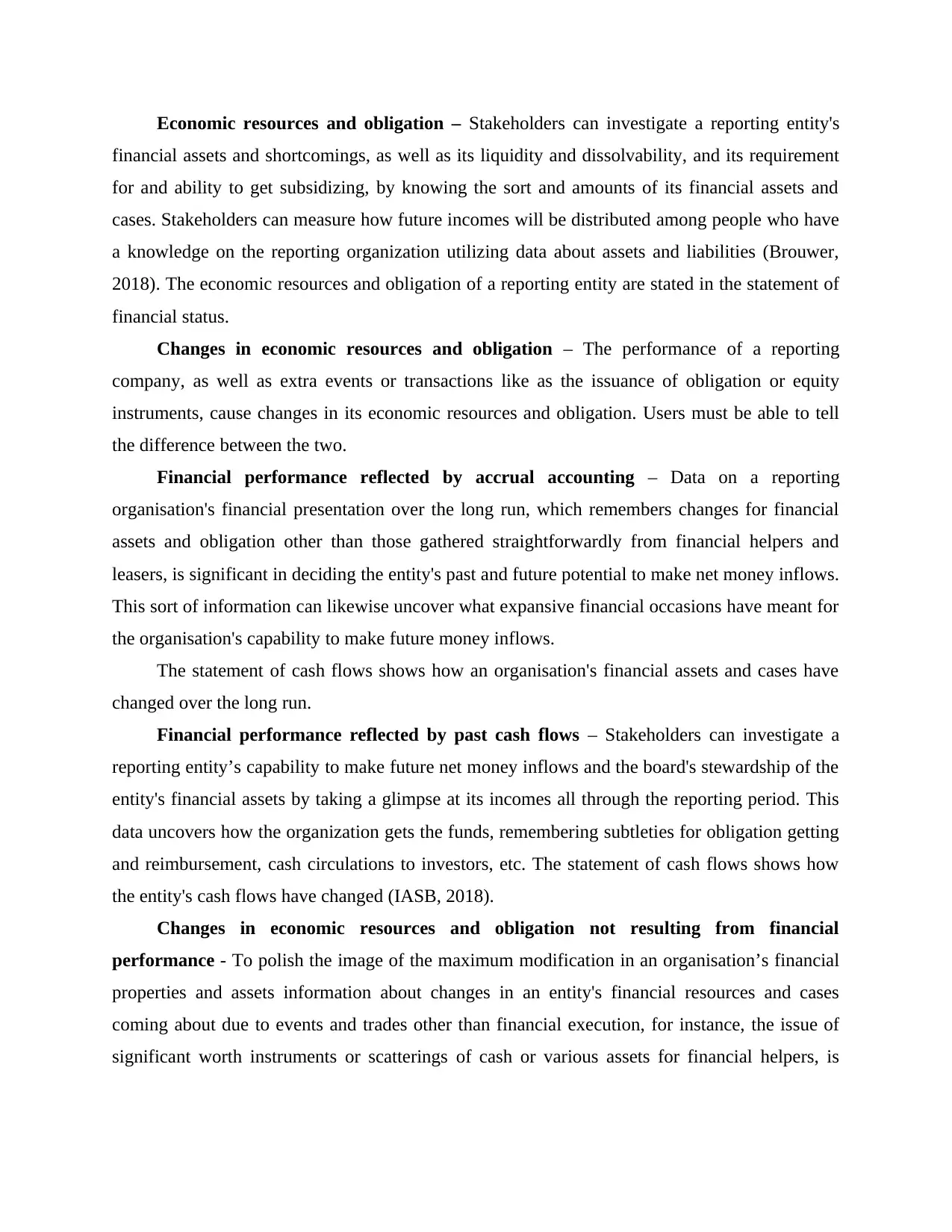
Economic resources and obligation – Stakeholders can investigate a reporting entity's
financial assets and shortcomings, as well as its liquidity and dissolvability, and its requirement
for and ability to get subsidizing, by knowing the sort and amounts of its financial assets and
cases. Stakeholders can measure how future incomes will be distributed among people who have
a knowledge on the reporting organization utilizing data about assets and liabilities (Brouwer,
2018). The economic resources and obligation of a reporting entity are stated in the statement of
financial status.
Changes in economic resources and obligation – The performance of a reporting
company, as well as extra events or transactions like as the issuance of obligation or equity
instruments, cause changes in its economic resources and obligation. Users must be able to tell
the difference between the two.
Financial performance reflected by accrual accounting – Data on a reporting
organisation's financial presentation over the long run, which remembers changes for financial
assets and obligation other than those gathered straightforwardly from financial helpers and
leasers, is significant in deciding the entity's past and future potential to make net money inflows.
This sort of information can likewise uncover what expansive financial occasions have meant for
the organisation's capability to make future money inflows.
The statement of cash flows shows how an organisation's financial assets and cases have
changed over the long run.
Financial performance reflected by past cash flows – Stakeholders can investigate a
reporting entity’s capability to make future net money inflows and the board's stewardship of the
entity's financial assets by taking a glimpse at its incomes all through the reporting period. This
data uncovers how the organization gets the funds, remembering subtleties for obligation getting
and reimbursement, cash circulations to investors, etc. The statement of cash flows shows how
the entity's cash flows have changed (IASB, 2018).
Changes in economic resources and obligation not resulting from financial
performance - To polish the image of the maximum modification in an organisation’s financial
properties and assets information about changes in an entity's financial resources and cases
coming about due to events and trades other than financial execution, for instance, the issue of
significant worth instruments or scatterings of cash or various assets for financial helpers, is
financial assets and shortcomings, as well as its liquidity and dissolvability, and its requirement
for and ability to get subsidizing, by knowing the sort and amounts of its financial assets and
cases. Stakeholders can measure how future incomes will be distributed among people who have
a knowledge on the reporting organization utilizing data about assets and liabilities (Brouwer,
2018). The economic resources and obligation of a reporting entity are stated in the statement of
financial status.
Changes in economic resources and obligation – The performance of a reporting
company, as well as extra events or transactions like as the issuance of obligation or equity
instruments, cause changes in its economic resources and obligation. Users must be able to tell
the difference between the two.
Financial performance reflected by accrual accounting – Data on a reporting
organisation's financial presentation over the long run, which remembers changes for financial
assets and obligation other than those gathered straightforwardly from financial helpers and
leasers, is significant in deciding the entity's past and future potential to make net money inflows.
This sort of information can likewise uncover what expansive financial occasions have meant for
the organisation's capability to make future money inflows.
The statement of cash flows shows how an organisation's financial assets and cases have
changed over the long run.
Financial performance reflected by past cash flows – Stakeholders can investigate a
reporting entity’s capability to make future net money inflows and the board's stewardship of the
entity's financial assets by taking a glimpse at its incomes all through the reporting period. This
data uncovers how the organization gets the funds, remembering subtleties for obligation getting
and reimbursement, cash circulations to investors, etc. The statement of cash flows shows how
the entity's cash flows have changed (IASB, 2018).
Changes in economic resources and obligation not resulting from financial
performance - To polish the image of the maximum modification in an organisation’s financial
properties and assets information about changes in an entity's financial resources and cases
coming about due to events and trades other than financial execution, for instance, the issue of
significant worth instruments or scatterings of cash or various assets for financial helpers, is
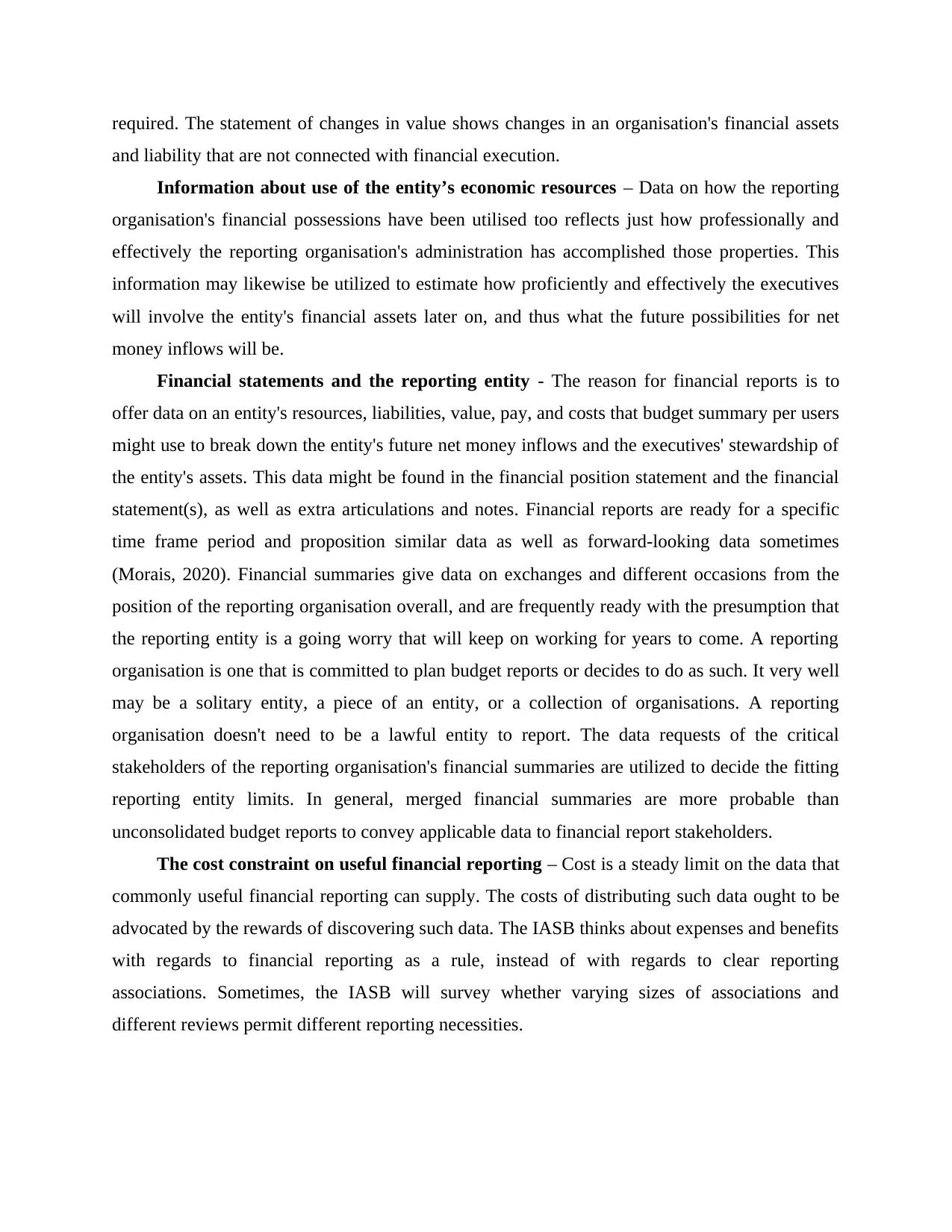
required. The statement of changes in value shows changes in an organisation's financial assets
and liability that are not connected with financial execution.
Information about use of the entity’s economic resources – Data on how the reporting
organisation's financial possessions have been utilised too reflects just how professionally and
effectively the reporting organisation's administration has accomplished those properties. This
information may likewise be utilized to estimate how proficiently and effectively the executives
will involve the entity's financial assets later on, and thus what the future possibilities for net
money inflows will be.
Financial statements and the reporting entity - The reason for financial reports is to
offer data on an entity's resources, liabilities, value, pay, and costs that budget summary per users
might use to break down the entity's future net money inflows and the executives' stewardship of
the entity's assets. This data might be found in the financial position statement and the financial
statement(s), as well as extra articulations and notes. Financial reports are ready for a specific
time frame period and proposition similar data as well as forward-looking data sometimes
(Morais, 2020). Financial summaries give data on exchanges and different occasions from the
position of the reporting organisation overall, and are frequently ready with the presumption that
the reporting entity is a going worry that will keep on working for years to come. A reporting
organisation is one that is committed to plan budget reports or decides to do as such. It very well
may be a solitary entity, a piece of an entity, or a collection of organisations. A reporting
organisation doesn't need to be a lawful entity to report. The data requests of the critical
stakeholders of the reporting organisation's financial summaries are utilized to decide the fitting
reporting entity limits. In general, merged financial summaries are more probable than
unconsolidated budget reports to convey applicable data to financial report stakeholders.
The cost constraint on useful financial reporting – Cost is a steady limit on the data that
commonly useful financial reporting can supply. The costs of distributing such data ought to be
advocated by the rewards of discovering such data. The IASB thinks about expenses and benefits
with regards to financial reporting as a rule, instead of with regards to clear reporting
associations. Sometimes, the IASB will survey whether varying sizes of associations and
different reviews permit different reporting necessities.
and liability that are not connected with financial execution.
Information about use of the entity’s economic resources – Data on how the reporting
organisation's financial possessions have been utilised too reflects just how professionally and
effectively the reporting organisation's administration has accomplished those properties. This
information may likewise be utilized to estimate how proficiently and effectively the executives
will involve the entity's financial assets later on, and thus what the future possibilities for net
money inflows will be.
Financial statements and the reporting entity - The reason for financial reports is to
offer data on an entity's resources, liabilities, value, pay, and costs that budget summary per users
might use to break down the entity's future net money inflows and the executives' stewardship of
the entity's assets. This data might be found in the financial position statement and the financial
statement(s), as well as extra articulations and notes. Financial reports are ready for a specific
time frame period and proposition similar data as well as forward-looking data sometimes
(Morais, 2020). Financial summaries give data on exchanges and different occasions from the
position of the reporting organisation overall, and are frequently ready with the presumption that
the reporting entity is a going worry that will keep on working for years to come. A reporting
organisation is one that is committed to plan budget reports or decides to do as such. It very well
may be a solitary entity, a piece of an entity, or a collection of organisations. A reporting
organisation doesn't need to be a lawful entity to report. The data requests of the critical
stakeholders of the reporting organisation's financial summaries are utilized to decide the fitting
reporting entity limits. In general, merged financial summaries are more probable than
unconsolidated budget reports to convey applicable data to financial report stakeholders.
The cost constraint on useful financial reporting – Cost is a steady limit on the data that
commonly useful financial reporting can supply. The costs of distributing such data ought to be
advocated by the rewards of discovering such data. The IASB thinks about expenses and benefits
with regards to financial reporting as a rule, instead of with regards to clear reporting
associations. Sometimes, the IASB will survey whether varying sizes of associations and
different reviews permit different reporting necessities.
⊘ This is a preview!⊘
Do you want full access?
Subscribe today to unlock all pages.

Trusted by 1+ million students worldwide
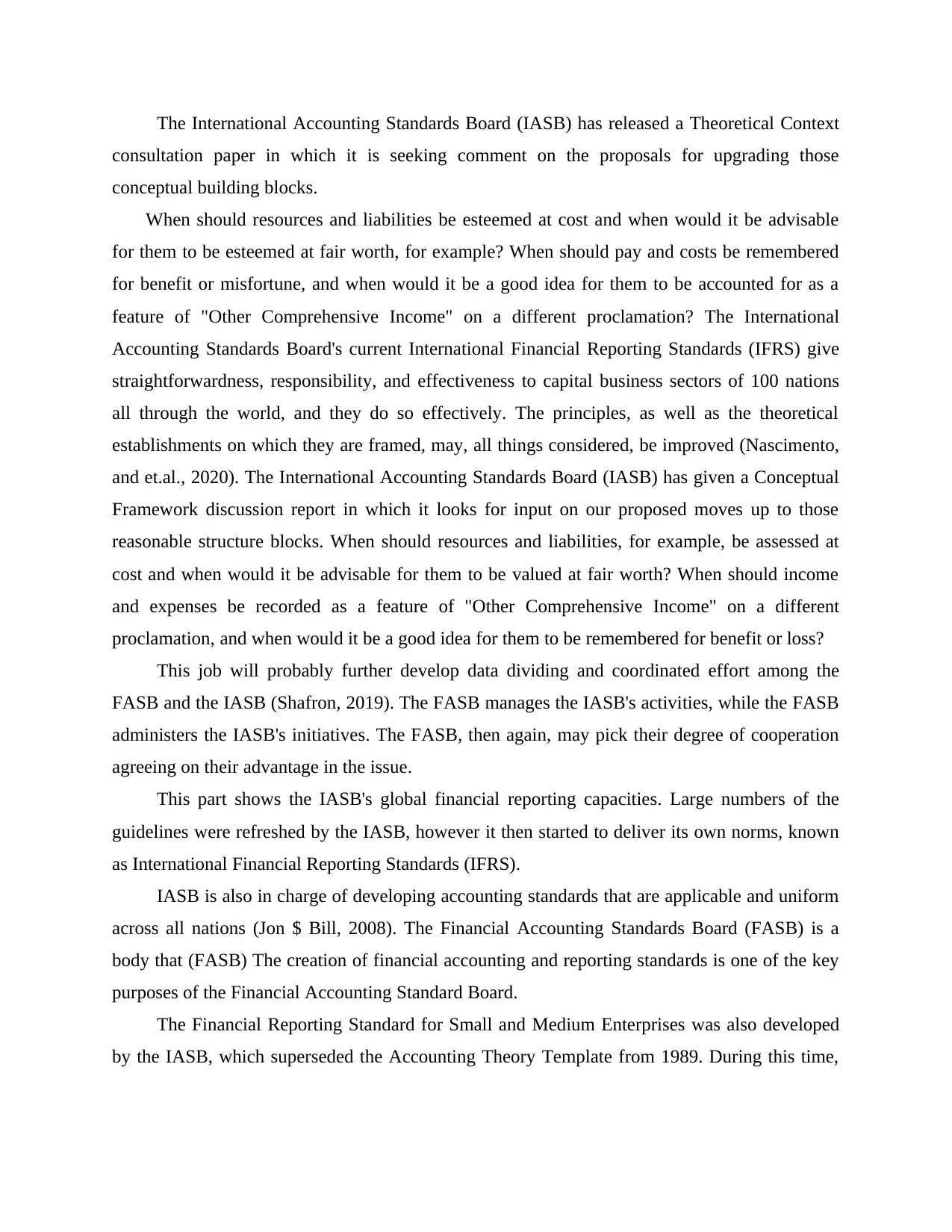
The International Accounting Standards Board (IASB) has released a Theoretical Context
consultation paper in which it is seeking comment on the proposals for upgrading those
conceptual building blocks.
When should resources and liabilities be esteemed at cost and when would it be advisable
for them to be esteemed at fair worth, for example? When should pay and costs be remembered
for benefit or misfortune, and when would it be a good idea for them to be accounted for as a
feature of "Other Comprehensive Income" on a different proclamation? The International
Accounting Standards Board's current International Financial Reporting Standards (IFRS) give
straightforwardness, responsibility, and effectiveness to capital business sectors of 100 nations
all through the world, and they do so effectively. The principles, as well as the theoretical
establishments on which they are framed, may, all things considered, be improved (Nascimento,
and et.al., 2020). The International Accounting Standards Board (IASB) has given a Conceptual
Framework discussion report in which it looks for input on our proposed moves up to those
reasonable structure blocks. When should resources and liabilities, for example, be assessed at
cost and when would it be advisable for them to be valued at fair worth? When should income
and expenses be recorded as a feature of "Other Comprehensive Income" on a different
proclamation, and when would it be a good idea for them to be remembered for benefit or loss?
This job will probably further develop data dividing and coordinated effort among the
FASB and the IASB (Shafron, 2019). The FASB manages the IASB's activities, while the FASB
administers the IASB's initiatives. The FASB, then again, may pick their degree of cooperation
agreeing on their advantage in the issue.
This part shows the IASB's global financial reporting capacities. Large numbers of the
guidelines were refreshed by the IASB, however it then started to deliver its own norms, known
as International Financial Reporting Standards (IFRS).
IASB is also in charge of developing accounting standards that are applicable and uniform
across all nations (Jon $ Bill, 2008). The Financial Accounting Standards Board (FASB) is a
body that (FASB) The creation of financial accounting and reporting standards is one of the key
purposes of the Financial Accounting Standard Board.
The Financial Reporting Standard for Small and Medium Enterprises was also developed
by the IASB, which superseded the Accounting Theory Template from 1989. During this time,
consultation paper in which it is seeking comment on the proposals for upgrading those
conceptual building blocks.
When should resources and liabilities be esteemed at cost and when would it be advisable
for them to be esteemed at fair worth, for example? When should pay and costs be remembered
for benefit or misfortune, and when would it be a good idea for them to be accounted for as a
feature of "Other Comprehensive Income" on a different proclamation? The International
Accounting Standards Board's current International Financial Reporting Standards (IFRS) give
straightforwardness, responsibility, and effectiveness to capital business sectors of 100 nations
all through the world, and they do so effectively. The principles, as well as the theoretical
establishments on which they are framed, may, all things considered, be improved (Nascimento,
and et.al., 2020). The International Accounting Standards Board (IASB) has given a Conceptual
Framework discussion report in which it looks for input on our proposed moves up to those
reasonable structure blocks. When should resources and liabilities, for example, be assessed at
cost and when would it be advisable for them to be valued at fair worth? When should income
and expenses be recorded as a feature of "Other Comprehensive Income" on a different
proclamation, and when would it be a good idea for them to be remembered for benefit or loss?
This job will probably further develop data dividing and coordinated effort among the
FASB and the IASB (Shafron, 2019). The FASB manages the IASB's activities, while the FASB
administers the IASB's initiatives. The FASB, then again, may pick their degree of cooperation
agreeing on their advantage in the issue.
This part shows the IASB's global financial reporting capacities. Large numbers of the
guidelines were refreshed by the IASB, however it then started to deliver its own norms, known
as International Financial Reporting Standards (IFRS).
IASB is also in charge of developing accounting standards that are applicable and uniform
across all nations (Jon $ Bill, 2008). The Financial Accounting Standards Board (FASB) is a
body that (FASB) The creation of financial accounting and reporting standards is one of the key
purposes of the Financial Accounting Standard Board.
The Financial Reporting Standard for Small and Medium Enterprises was also developed
by the IASB, which superseded the Accounting Theory Template from 1989. During this time,
Paraphrase This Document
Need a fresh take? Get an instant paraphrase of this document with our AI Paraphraser
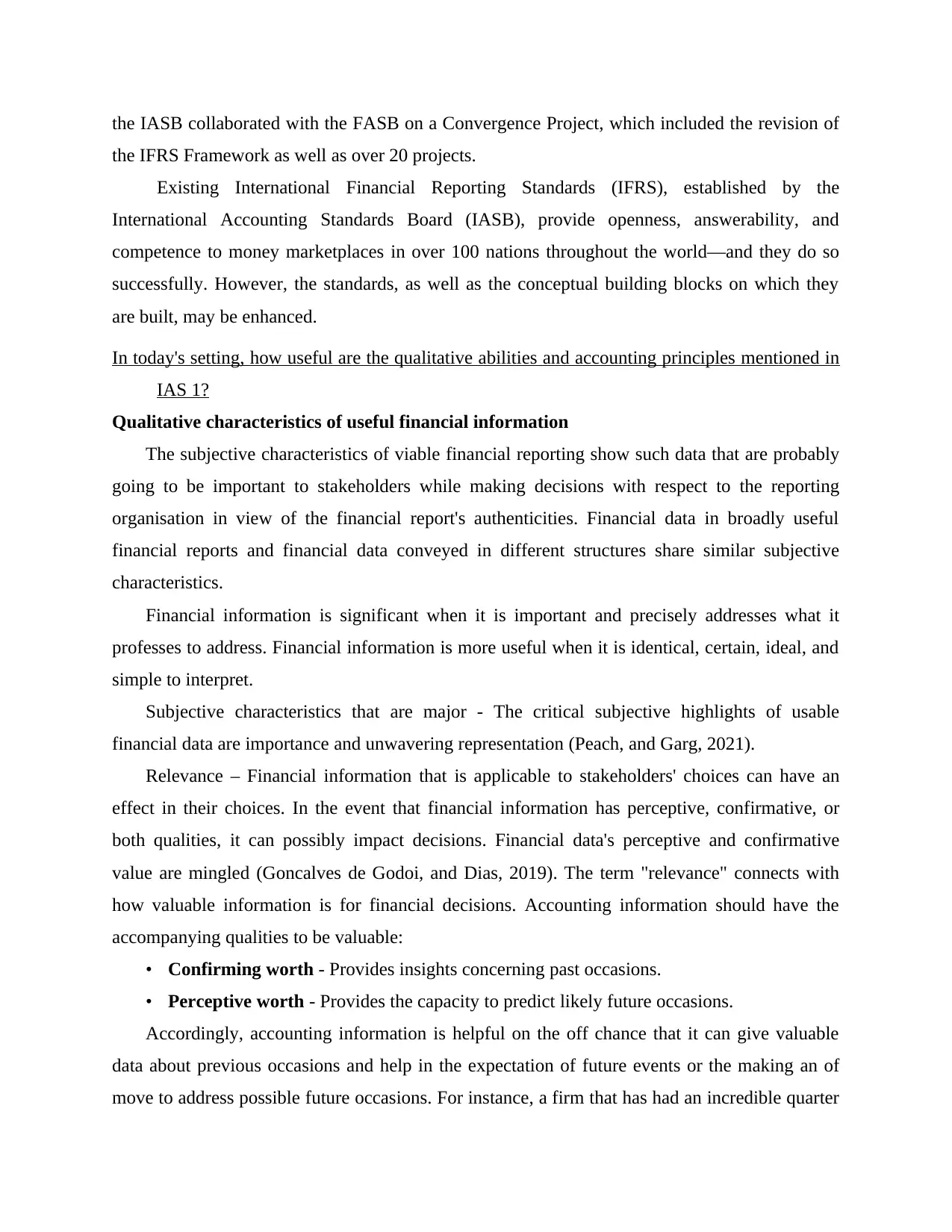
the IASB collaborated with the FASB on a Convergence Project, which included the revision of
the IFRS Framework as well as over 20 projects.
Existing International Financial Reporting Standards (IFRS), established by the
International Accounting Standards Board (IASB), provide openness, answerability, and
competence to money marketplaces in over 100 nations throughout the world—and they do so
successfully. However, the standards, as well as the conceptual building blocks on which they
are built, may be enhanced.
In today's setting, how useful are the qualitative abilities and accounting principles mentioned in
IAS 1?
Qualitative characteristics of useful financial information
The subjective characteristics of viable financial reporting show such data that are probably
going to be important to stakeholders while making decisions with respect to the reporting
organisation in view of the financial report's authenticities. Financial data in broadly useful
financial reports and financial data conveyed in different structures share similar subjective
characteristics.
Financial information is significant when it is important and precisely addresses what it
professes to address. Financial information is more useful when it is identical, certain, ideal, and
simple to interpret.
Subjective characteristics that are major - The critical subjective highlights of usable
financial data are importance and unwavering representation (Peach, and Garg, 2021).
Relevance – Financial information that is applicable to stakeholders' choices can have an
effect in their choices. In the event that financial information has perceptive, confirmative, or
both qualities, it can possibly impact decisions. Financial data's perceptive and confirmative
value are mingled (Goncalves de Godoi, and Dias, 2019). The term "relevance" connects with
how valuable information is for financial decisions. Accounting information should have the
accompanying qualities to be valuable:
• Confirming worth - Provides insights concerning past occasions.
• Perceptive worth - Provides the capacity to predict likely future occasions.
Accordingly, accounting information is helpful on the off chance that it can give valuable
data about previous occasions and help in the expectation of future events or the making an of
move to address possible future occasions. For instance, a firm that has had an incredible quarter
the IFRS Framework as well as over 20 projects.
Existing International Financial Reporting Standards (IFRS), established by the
International Accounting Standards Board (IASB), provide openness, answerability, and
competence to money marketplaces in over 100 nations throughout the world—and they do so
successfully. However, the standards, as well as the conceptual building blocks on which they
are built, may be enhanced.
In today's setting, how useful are the qualitative abilities and accounting principles mentioned in
IAS 1?
Qualitative characteristics of useful financial information
The subjective characteristics of viable financial reporting show such data that are probably
going to be important to stakeholders while making decisions with respect to the reporting
organisation in view of the financial report's authenticities. Financial data in broadly useful
financial reports and financial data conveyed in different structures share similar subjective
characteristics.
Financial information is significant when it is important and precisely addresses what it
professes to address. Financial information is more useful when it is identical, certain, ideal, and
simple to interpret.
Subjective characteristics that are major - The critical subjective highlights of usable
financial data are importance and unwavering representation (Peach, and Garg, 2021).
Relevance – Financial information that is applicable to stakeholders' choices can have an
effect in their choices. In the event that financial information has perceptive, confirmative, or
both qualities, it can possibly impact decisions. Financial data's perceptive and confirmative
value are mingled (Goncalves de Godoi, and Dias, 2019). The term "relevance" connects with
how valuable information is for financial decisions. Accounting information should have the
accompanying qualities to be valuable:
• Confirming worth - Provides insights concerning past occasions.
• Perceptive worth - Provides the capacity to predict likely future occasions.
Accordingly, accounting information is helpful on the off chance that it can give valuable
data about previous occasions and help in the expectation of future events or the making an of
move to address possible future occasions. For instance, a firm that has had an incredible quarter
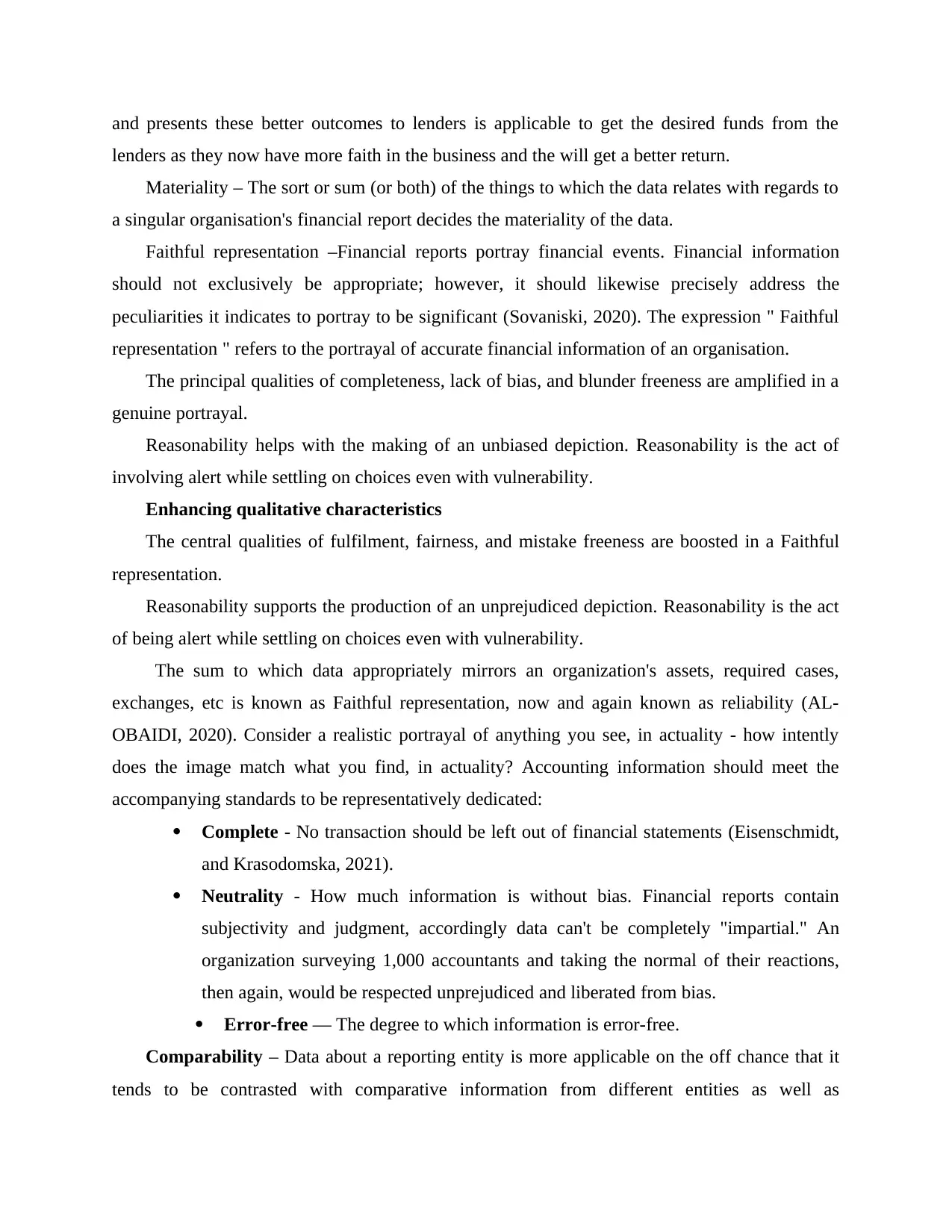
and presents these better outcomes to lenders is applicable to get the desired funds from the
lenders as they now have more faith in the business and the will get a better return.
Materiality – The sort or sum (or both) of the things to which the data relates with regards to
a singular organisation's financial report decides the materiality of the data.
Faithful representation –Financial reports portray financial events. Financial information
should not exclusively be appropriate; however, it should likewise precisely address the
peculiarities it indicates to portray to be significant (Sovaniski, 2020). The expression " Faithful
representation " refers to the portrayal of accurate financial information of an organisation.
The principal qualities of completeness, lack of bias, and blunder freeness are amplified in a
genuine portrayal.
Reasonability helps with the making of an unbiased depiction. Reasonability is the act of
involving alert while settling on choices even with vulnerability.
Enhancing qualitative characteristics
The central qualities of fulfilment, fairness, and mistake freeness are boosted in a Faithful
representation.
Reasonability supports the production of an unprejudiced depiction. Reasonability is the act
of being alert while settling on choices even with vulnerability.
The sum to which data appropriately mirrors an organization's assets, required cases,
exchanges, etc is known as Faithful representation, now and again known as reliability (AL-
OBAIDI, 2020). Consider a realistic portrayal of anything you see, in actuality - how intently
does the image match what you find, in actuality? Accounting information should meet the
accompanying standards to be representatively dedicated:
Complete - No transaction should be left out of financial statements (Eisenschmidt,
and Krasodomska, 2021).
Neutrality - How much information is without bias. Financial reports contain
subjectivity and judgment, accordingly data can't be completely "impartial." An
organization surveying 1,000 accountants and taking the normal of their reactions,
then again, would be respected unprejudiced and liberated from bias.
Error-free — The degree to which information is error-free.
Comparability – Data about a reporting entity is more applicable on the off chance that it
tends to be contrasted with comparative information from different entities as well as
lenders as they now have more faith in the business and the will get a better return.
Materiality – The sort or sum (or both) of the things to which the data relates with regards to
a singular organisation's financial report decides the materiality of the data.
Faithful representation –Financial reports portray financial events. Financial information
should not exclusively be appropriate; however, it should likewise precisely address the
peculiarities it indicates to portray to be significant (Sovaniski, 2020). The expression " Faithful
representation " refers to the portrayal of accurate financial information of an organisation.
The principal qualities of completeness, lack of bias, and blunder freeness are amplified in a
genuine portrayal.
Reasonability helps with the making of an unbiased depiction. Reasonability is the act of
involving alert while settling on choices even with vulnerability.
Enhancing qualitative characteristics
The central qualities of fulfilment, fairness, and mistake freeness are boosted in a Faithful
representation.
Reasonability supports the production of an unprejudiced depiction. Reasonability is the act
of being alert while settling on choices even with vulnerability.
The sum to which data appropriately mirrors an organization's assets, required cases,
exchanges, etc is known as Faithful representation, now and again known as reliability (AL-
OBAIDI, 2020). Consider a realistic portrayal of anything you see, in actuality - how intently
does the image match what you find, in actuality? Accounting information should meet the
accompanying standards to be representatively dedicated:
Complete - No transaction should be left out of financial statements (Eisenschmidt,
and Krasodomska, 2021).
Neutrality - How much information is without bias. Financial reports contain
subjectivity and judgment, accordingly data can't be completely "impartial." An
organization surveying 1,000 accountants and taking the normal of their reactions,
then again, would be respected unprejudiced and liberated from bias.
Error-free — The degree to which information is error-free.
Comparability – Data about a reporting entity is more applicable on the off chance that it
tends to be contrasted with comparative information from different entities as well as
⊘ This is a preview!⊘
Do you want full access?
Subscribe today to unlock all pages.

Trusted by 1+ million students worldwide
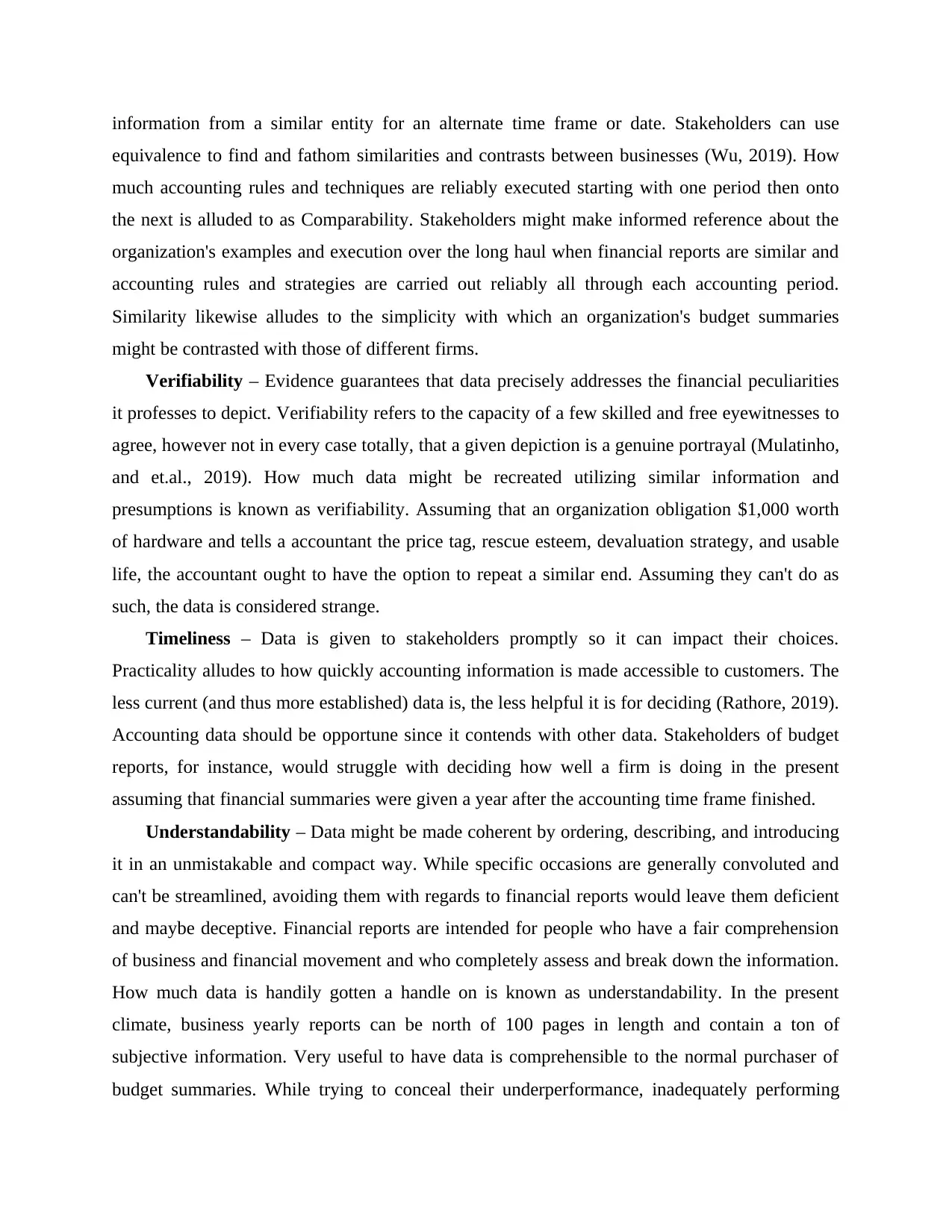
information from a similar entity for an alternate time frame or date. Stakeholders can use
equivalence to find and fathom similarities and contrasts between businesses (Wu, 2019). How
much accounting rules and techniques are reliably executed starting with one period then onto
the next is alluded to as Comparability. Stakeholders might make informed reference about the
organization's examples and execution over the long haul when financial reports are similar and
accounting rules and strategies are carried out reliably all through each accounting period.
Similarity likewise alludes to the simplicity with which an organization's budget summaries
might be contrasted with those of different firms.
Verifiability – Evidence guarantees that data precisely addresses the financial peculiarities
it professes to depict. Verifiability refers to the capacity of a few skilled and free eyewitnesses to
agree, however not in every case totally, that a given depiction is a genuine portrayal (Mulatinho,
and et.al., 2019). How much data might be recreated utilizing similar information and
presumptions is known as verifiability. Assuming that an organization obligation $1,000 worth
of hardware and tells a accountant the price tag, rescue esteem, devaluation strategy, and usable
life, the accountant ought to have the option to repeat a similar end. Assuming they can't do as
such, the data is considered strange.
Timeliness – Data is given to stakeholders promptly so it can impact their choices.
Practicality alludes to how quickly accounting information is made accessible to customers. The
less current (and thus more established) data is, the less helpful it is for deciding (Rathore, 2019).
Accounting data should be opportune since it contends with other data. Stakeholders of budget
reports, for instance, would struggle with deciding how well a firm is doing in the present
assuming that financial summaries were given a year after the accounting time frame finished.
Understandability – Data might be made coherent by ordering, describing, and introducing
it in an unmistakable and compact way. While specific occasions are generally convoluted and
can't be streamlined, avoiding them with regards to financial reports would leave them deficient
and maybe deceptive. Financial reports are intended for people who have a fair comprehension
of business and financial movement and who completely assess and break down the information.
How much data is handily gotten a handle on is known as understandability. In the present
climate, business yearly reports can be north of 100 pages in length and contain a ton of
subjective information. Very useful to have data is comprehensible to the normal purchaser of
budget summaries. While trying to conceal their underperformance, inadequately performing
equivalence to find and fathom similarities and contrasts between businesses (Wu, 2019). How
much accounting rules and techniques are reliably executed starting with one period then onto
the next is alluded to as Comparability. Stakeholders might make informed reference about the
organization's examples and execution over the long haul when financial reports are similar and
accounting rules and strategies are carried out reliably all through each accounting period.
Similarity likewise alludes to the simplicity with which an organization's budget summaries
might be contrasted with those of different firms.
Verifiability – Evidence guarantees that data precisely addresses the financial peculiarities
it professes to depict. Verifiability refers to the capacity of a few skilled and free eyewitnesses to
agree, however not in every case totally, that a given depiction is a genuine portrayal (Mulatinho,
and et.al., 2019). How much data might be recreated utilizing similar information and
presumptions is known as verifiability. Assuming that an organization obligation $1,000 worth
of hardware and tells a accountant the price tag, rescue esteem, devaluation strategy, and usable
life, the accountant ought to have the option to repeat a similar end. Assuming they can't do as
such, the data is considered strange.
Timeliness – Data is given to stakeholders promptly so it can impact their choices.
Practicality alludes to how quickly accounting information is made accessible to customers. The
less current (and thus more established) data is, the less helpful it is for deciding (Rathore, 2019).
Accounting data should be opportune since it contends with other data. Stakeholders of budget
reports, for instance, would struggle with deciding how well a firm is doing in the present
assuming that financial summaries were given a year after the accounting time frame finished.
Understandability – Data might be made coherent by ordering, describing, and introducing
it in an unmistakable and compact way. While specific occasions are generally convoluted and
can't be streamlined, avoiding them with regards to financial reports would leave them deficient
and maybe deceptive. Financial reports are intended for people who have a fair comprehension
of business and financial movement and who completely assess and break down the information.
How much data is handily gotten a handle on is known as understandability. In the present
climate, business yearly reports can be north of 100 pages in length and contain a ton of
subjective information. Very useful to have data is comprehensible to the normal purchaser of
budget summaries. While trying to conceal their underperformance, inadequately performing
Paraphrase This Document
Need a fresh take? Get an instant paraphrase of this document with our AI Paraphraser
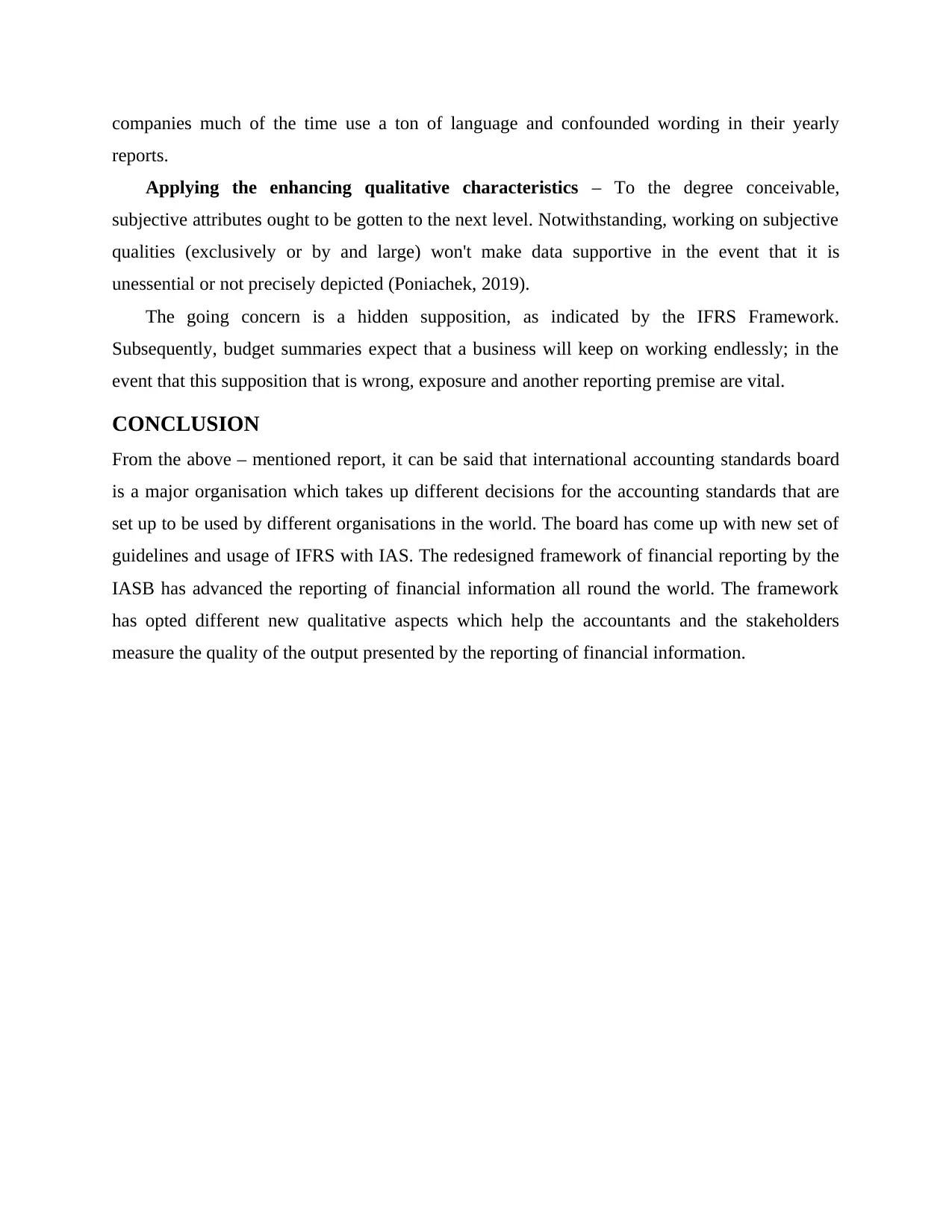
companies much of the time use a ton of language and confounded wording in their yearly
reports.
Applying the enhancing qualitative characteristics – To the degree conceivable,
subjective attributes ought to be gotten to the next level. Notwithstanding, working on subjective
qualities (exclusively or by and large) won't make data supportive in the event that it is
unessential or not precisely depicted (Poniachek, 2019).
The going concern is a hidden supposition, as indicated by the IFRS Framework.
Subsequently, budget summaries expect that a business will keep on working endlessly; in the
event that this supposition that is wrong, exposure and another reporting premise are vital.
CONCLUSION
From the above – mentioned report, it can be said that international accounting standards board
is a major organisation which takes up different decisions for the accounting standards that are
set up to be used by different organisations in the world. The board has come up with new set of
guidelines and usage of IFRS with IAS. The redesigned framework of financial reporting by the
IASB has advanced the reporting of financial information all round the world. The framework
has opted different new qualitative aspects which help the accountants and the stakeholders
measure the quality of the output presented by the reporting of financial information.
reports.
Applying the enhancing qualitative characteristics – To the degree conceivable,
subjective attributes ought to be gotten to the next level. Notwithstanding, working on subjective
qualities (exclusively or by and large) won't make data supportive in the event that it is
unessential or not precisely depicted (Poniachek, 2019).
The going concern is a hidden supposition, as indicated by the IFRS Framework.
Subsequently, budget summaries expect that a business will keep on working endlessly; in the
event that this supposition that is wrong, exposure and another reporting premise are vital.
CONCLUSION
From the above – mentioned report, it can be said that international accounting standards board
is a major organisation which takes up different decisions for the accounting standards that are
set up to be used by different organisations in the world. The board has come up with new set of
guidelines and usage of IFRS with IAS. The redesigned framework of financial reporting by the
IASB has advanced the reporting of financial information all round the world. The framework
has opted different new qualitative aspects which help the accountants and the stakeholders
measure the quality of the output presented by the reporting of financial information.
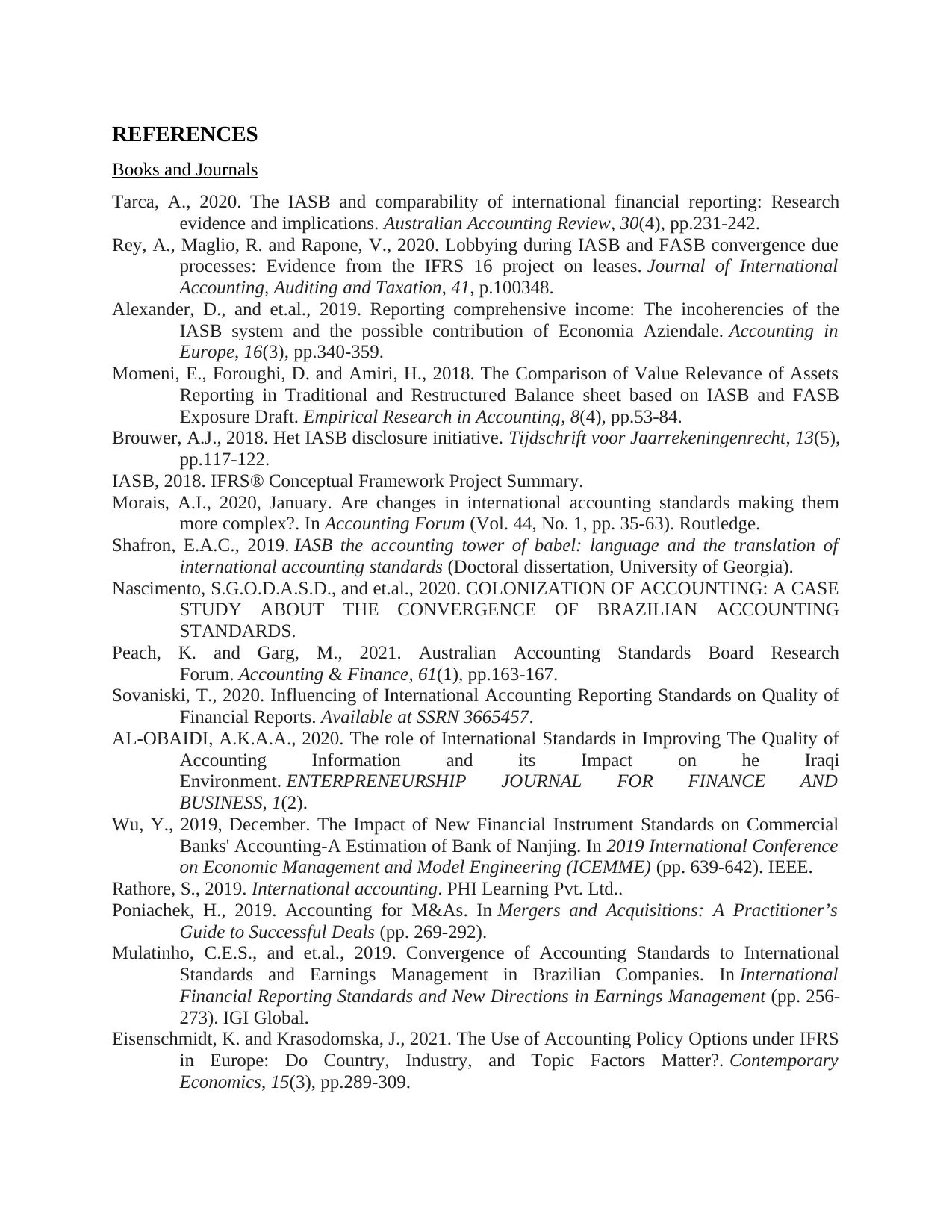
REFERENCES
Books and Journals
Tarca, A., 2020. The IASB and comparability of international financial reporting: Research
evidence and implications. Australian Accounting Review, 30(4), pp.231-242.
Rey, A., Maglio, R. and Rapone, V., 2020. Lobbying during IASB and FASB convergence due
processes: Evidence from the IFRS 16 project on leases. Journal of International
Accounting, Auditing and Taxation, 41, p.100348.
Alexander, D., and et.al., 2019. Reporting comprehensive income: The incoherencies of the
IASB system and the possible contribution of Economia Aziendale. Accounting in
Europe, 16(3), pp.340-359.
Momeni, E., Foroughi, D. and Amiri, H., 2018. The Comparison of Value Relevance of Assets
Reporting in Traditional and Restructured Balance sheet based on IASB and FASB
Exposure Draft. Empirical Research in Accounting, 8(4), pp.53-84.
Brouwer, A.J., 2018. Het IASB disclosure initiative. Tijdschrift voor Jaarrekeningenrecht, 13(5),
pp.117-122.
IASB, 2018. IFRS® Conceptual Framework Project Summary.
Morais, A.I., 2020, January. Are changes in international accounting standards making them
more complex?. In Accounting Forum (Vol. 44, No. 1, pp. 35-63). Routledge.
Shafron, E.A.C., 2019. IASB the accounting tower of babel: language and the translation of
international accounting standards (Doctoral dissertation, University of Georgia).
Nascimento, S.G.O.D.A.S.D., and et.al., 2020. COLONIZATION OF ACCOUNTING: A CASE
STUDY ABOUT THE CONVERGENCE OF BRAZILIAN ACCOUNTING
STANDARDS.
Peach, K. and Garg, M., 2021. Australian Accounting Standards Board Research
Forum. Accounting & Finance, 61(1), pp.163-167.
Sovaniski, T., 2020. Influencing of International Accounting Reporting Standards on Quality of
Financial Reports. Available at SSRN 3665457.
AL-OBAIDI, A.K.A.A., 2020. The role of International Standards in Improving The Quality of
Accounting Information and its Impact on he Iraqi
Environment. ENTERPRENEURSHIP JOURNAL FOR FINANCE AND
BUSINESS, 1(2).
Wu, Y., 2019, December. The Impact of New Financial Instrument Standards on Commercial
Banks' Accounting-A Estimation of Bank of Nanjing. In 2019 International Conference
on Economic Management and Model Engineering (ICEMME) (pp. 639-642). IEEE.
Rathore, S., 2019. International accounting. PHI Learning Pvt. Ltd..
Poniachek, H., 2019. Accounting for M&As. In Mergers and Acquisitions: A Practitioner’s
Guide to Successful Deals (pp. 269-292).
Mulatinho, C.E.S., and et.al., 2019. Convergence of Accounting Standards to International
Standards and Earnings Management in Brazilian Companies. In International
Financial Reporting Standards and New Directions in Earnings Management (pp. 256-
273). IGI Global.
Eisenschmidt, K. and Krasodomska, J., 2021. The Use of Accounting Policy Options under IFRS
in Europe: Do Country, Industry, and Topic Factors Matter?. Contemporary
Economics, 15(3), pp.289-309.
Books and Journals
Tarca, A., 2020. The IASB and comparability of international financial reporting: Research
evidence and implications. Australian Accounting Review, 30(4), pp.231-242.
Rey, A., Maglio, R. and Rapone, V., 2020. Lobbying during IASB and FASB convergence due
processes: Evidence from the IFRS 16 project on leases. Journal of International
Accounting, Auditing and Taxation, 41, p.100348.
Alexander, D., and et.al., 2019. Reporting comprehensive income: The incoherencies of the
IASB system and the possible contribution of Economia Aziendale. Accounting in
Europe, 16(3), pp.340-359.
Momeni, E., Foroughi, D. and Amiri, H., 2018. The Comparison of Value Relevance of Assets
Reporting in Traditional and Restructured Balance sheet based on IASB and FASB
Exposure Draft. Empirical Research in Accounting, 8(4), pp.53-84.
Brouwer, A.J., 2018. Het IASB disclosure initiative. Tijdschrift voor Jaarrekeningenrecht, 13(5),
pp.117-122.
IASB, 2018. IFRS® Conceptual Framework Project Summary.
Morais, A.I., 2020, January. Are changes in international accounting standards making them
more complex?. In Accounting Forum (Vol. 44, No. 1, pp. 35-63). Routledge.
Shafron, E.A.C., 2019. IASB the accounting tower of babel: language and the translation of
international accounting standards (Doctoral dissertation, University of Georgia).
Nascimento, S.G.O.D.A.S.D., and et.al., 2020. COLONIZATION OF ACCOUNTING: A CASE
STUDY ABOUT THE CONVERGENCE OF BRAZILIAN ACCOUNTING
STANDARDS.
Peach, K. and Garg, M., 2021. Australian Accounting Standards Board Research
Forum. Accounting & Finance, 61(1), pp.163-167.
Sovaniski, T., 2020. Influencing of International Accounting Reporting Standards on Quality of
Financial Reports. Available at SSRN 3665457.
AL-OBAIDI, A.K.A.A., 2020. The role of International Standards in Improving The Quality of
Accounting Information and its Impact on he Iraqi
Environment. ENTERPRENEURSHIP JOURNAL FOR FINANCE AND
BUSINESS, 1(2).
Wu, Y., 2019, December. The Impact of New Financial Instrument Standards on Commercial
Banks' Accounting-A Estimation of Bank of Nanjing. In 2019 International Conference
on Economic Management and Model Engineering (ICEMME) (pp. 639-642). IEEE.
Rathore, S., 2019. International accounting. PHI Learning Pvt. Ltd..
Poniachek, H., 2019. Accounting for M&As. In Mergers and Acquisitions: A Practitioner’s
Guide to Successful Deals (pp. 269-292).
Mulatinho, C.E.S., and et.al., 2019. Convergence of Accounting Standards to International
Standards and Earnings Management in Brazilian Companies. In International
Financial Reporting Standards and New Directions in Earnings Management (pp. 256-
273). IGI Global.
Eisenschmidt, K. and Krasodomska, J., 2021. The Use of Accounting Policy Options under IFRS
in Europe: Do Country, Industry, and Topic Factors Matter?. Contemporary
Economics, 15(3), pp.289-309.
⊘ This is a preview!⊘
Do you want full access?
Subscribe today to unlock all pages.

Trusted by 1+ million students worldwide
1 out of 13
Related Documents
Your All-in-One AI-Powered Toolkit for Academic Success.
+13062052269
info@desklib.com
Available 24*7 on WhatsApp / Email
![[object Object]](/_next/static/media/star-bottom.7253800d.svg)
Unlock your academic potential
Copyright © 2020–2026 A2Z Services. All Rights Reserved. Developed and managed by ZUCOL.




